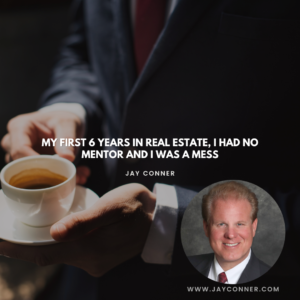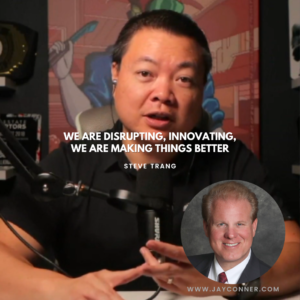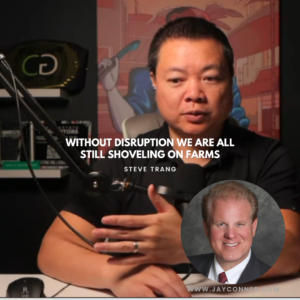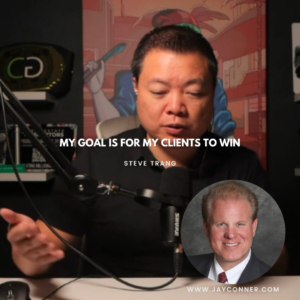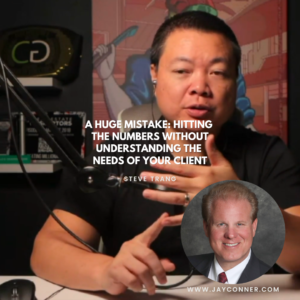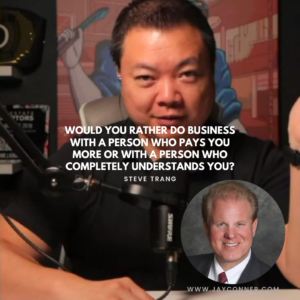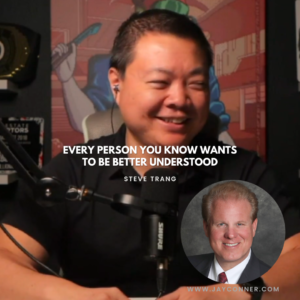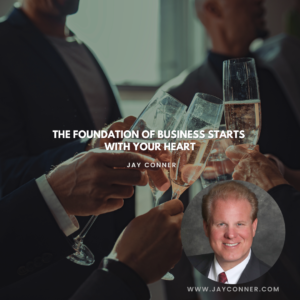In today’s episode of the Raising Private Money podcast, we have a fascinating discussion with Jay Conner and Steve Trang. Discover the secrets of effective communication through understanding tone and pace!
Jay Conner kicks off the conversation by highlighting the importance of adjusting the speaking pace to match prospects and clients. He shares insights on intentionally slowing down and using pauses and repetitions to convey empathy and care. It’s incredible how a slight shift in tone can transform a conversation, as Jay gives an example of how a different tone can come across as sarcastic and uncaring.
But it’s not just about business; Jay emphasizes the importance of being there for family over money. He contrasts a respectful and understanding tone with a rude and insensitive one, reminding us that seeking to understand is the first step in any relationship.
In this episode, we also dive into the intriguing background of the Real Estate Disruptors podcast and movement. Steve Trang shares how the name “Real Estate Disruptors” came about and offers insights into the impact of disruptive innovations in the real estate market.
The interview delves into the current state of AI technology and its potential applications, including its role in real estate wholesaling and negotiation.
Steve’s extensive experience as a coach and mentor shines through as he discusses the importance of understanding objectives and guidelines to provide exceptional service. He reveals his coaching philosophy and shares success stories of clients who have transformed their businesses through negotiation coaching.
This conversation is not one to miss if you’re seeking to enhance your communication skills and revolutionize your real estate endeavors. Join us for an enlightening discussion on the power of tone, pace, and disruptive innovation in real estate!
Timestamps:
00:00 – Real estate disruptor creates 100 millionaires
03:39 – Real Estate Disruptor: A Magical Name and Inspiration
07:54 – AI’s influence on real estate investment today.
10:00 – Is AI really a big help for real estate investors?
16:22 – Natural charisma limits growth; coaching is crucial.
19:45 – Mirroring builds rapport and gains trust.
25:07 – Tone and pace convey empathy or sarcasm.
27:59 – Understanding goals, objectives, and parameters is vital.
31:48 – JCPenney’s success: Hire nice people.
33:05 – Connect With Steve Trang: https://www.SteveTrang.com
34:07 – Get a free guide to Raising Private Money: https://www.JayConner.com/MoneyGuide
Connect With Jay Conner:
Private Money Academy Conference:
https://www.JaysLiveEvent.com
Free Report:
https://www.jayconner.com/MoneyReport
Join the Private Money Academy:
https://www.JayConner.com/trial/
Have you read Jay’s new book: Where to Get The Money Now?
It is available FREE (all you pay is the shipping and handling) at https://www.JayConner.com/Book
What is Private Money? Real Estate Investing with Jay Conner
http://www.JayConner.com/MoneyPodcast
Jay Conner is a proven real estate investment leader. Without using his own money or credit, Jay maximizes creative methods to buy and sell properties with profits averaging $67,000 per deal.
#RealEstate #PrivateMoney #FlipYourHouse #RealEstateInvestor
Disrupting the Real Estate Market: AI, Automation, and the Future of Investment With Steve Trang & Jay Conner
Jay Conner [00:00:00]:
My guest today is here on Raising Private Money. He’s the founder of the real estate disruptors movement. Now, he started the Real Estate Disruptors podcast back in 2018. The reason he did it was to inspire wholesalers and real estate agents on how to double their incomes by adding this second leg to their business. The podcast has now grown to well over $100,000 downloads a month with new members of the community sharing their success stories every week. I was so blessed to be a guest on Steve’s podcast as well. Now, in addition to all that, he has created what’s called the Offer Fast Homes app. We’ll want to talk about that. Now, the purpose of this app is to help wholesalers jumpstart their careers faster by putting all the buyers in one place. Now, the hope is to minimize the challenge of building a buyer list when getting started in wholesaling. Now, Offer Fast has emerged with Investorlift to create a nationwide network. Now my guest legacy will be to create 100 millionaires. One of his favorite quotes is from my hero Zig Ziglar. You know what Zig Ziglar was known for saying you can have everything in life you want if you would just help enough other people get what they want. Now, he first heard this quote when he got into real estate, and it stuck with him throughout his entire career, just like myself. It’s essentially one of the core values that it lives by. Now, since starting his realty brokerage company back in 2013, which is called Stunning Homes Realty, his company has over 130 agents in the greater Phoenix area. His company has almost a 1% market share. And so one out of every 137 homes in Phoenix metro is sold by his company, Stunning Homes. Ridley, in just a moment, you’re going to meet my dear friend, fellow mastermind member Steve Trang right after this.
Narrator [00:02:12]:
If you’re a real estate investor and are wondering how to raise and leverage Private Money to make more profit on every deal, then you’re in the right place on Raising Private Money. We’ll speak with new and seasoned investors to dissect their deals and extract the best tips and strategies to help you get the money. Because the money comes first. Now here’s your host, Jay Conner.
Jay Conner [00:02:40]:
Welcome to Raising Private Money, Steve.
Steve Trang [00:02:44]:
Thank you. Thank you for having me. I love any opportunity I get to hang out with my good friend Jay Conner.
Jay Conner [00:02:50]:
Same here, Steve. Same here, Steve. Now, you have a lot going on and you’re the creator and visionary of some amazing companies. I mean, first of all, your podcast, Real Estate Disruptors, like I was talking about in the intro. Then you’ve got your realty company and then you got this amazing app for wholesalers. I want to start first of all with Real Estate Disruptors. So you have an amazing podcast. I was blessed to be a guest on there as well, talking about Private Money in the past. Where did you come up with the name? Why real estate disruptors. What’s the disrupting part of real estate that you talk about? And what was the motivation or the inspiration for this podcast?
Steve Trang [00:03:39]:
Man if I tell you how the name came about, it might be kind of like a magician’s trick. It might ruin the magic for me. I was looking at a handful of names, but the names I was looking for, this was the only one that was available as a URL realestatedisruptors.com. So I went with a few different names high Leverage, impact, this, and that. And this was around a time where like, hey, this company is disrupting the real estate market. This company is disrupting the real estate market. It’s like, well, this seems to be a trending news headline, so let’s just go ahead with Real Estate Disruptor. But the unsexy answer is buying a URL that was the available URL. So I had a few different options. That was the only one that had an available URL. As to why a lot of it is due to my grandmother, who had a horrific relationship. It was just not a good relationship, right? But I remember on her 100th birthday, she was surrounded by all her kid’s grandkids, great grandkids. And I looked, and this is a woman who was a single mother when my dad was eight, and she was able to take all her kids from Vietnam to the US. Have all their grandkids, either graduate college in college or on their way to going college. You talk about impact and legacy. She’s done that. And so I saw that, and I saw that picture when we were at her memorial, right? So I left. I had a friend have an extra ticket to Dean Graziosi’s event, The Edge, and he’s like, hey, you want to go? I was like, yeah, of course I want to go. And then my grandmother passes, and I show up. I go from the funeral to this event, right? And at this event, they’re talking about, you got this guy on stage, Brendan Burchard, talking about, everyone wants to hear your story, right? So you didn’t need to have a blog, a book, or a podcast. Now I have a book. It sucked. I had a blog and did nothing. So I was like, well, let’s just do the podcast thing, right? So I committed that Saturday to launch a podcast, and nine days later, I had a podcast. So that’s the inspiration for the podcast, I hear.
Jay Conner [00:06:11]:
You know, some of our best inspirations come from our coaches, come from our you know, I just cannot imagine being in real estate without a coach, without a mentor, except I actually can. Steve my first six years that I was in this business, no mentor, no coach, and, oh, my word, I was a mess. I hate to think about the hundreds of thousands of dollars that I lost because I just didn’t have anybody holding my hand. What a cool name. Real estate disruptors. Is disruption a good thing?
Steve Trang [00:06:50]:
I think disruption is a great thing, right? What is the term? It’s in capitalism, right? Where it’s something construction. Constructive destruction, I think, is what it is. Right? So constructive destruction or whatever, we’re disrupting, we’re innovating, we’re making things better. I mean, right now with AI, right, we’re innovating. Right now, disruption is a good thing. Without disruption, we’d all be, what, shoveling on our farms? What would we be doing right now if there was no evolution? We would have fire because that’s natural. But beyond that, we are disrupted when we put a shiny rock or a sharp rock on a piece of wood, right? That was disrupting something. So there’s just constant innovation. And for me, being a person with a little bit of a lot of shiny object syndrome, I’m attracted to disruption. I’m attracted to the new advantage, this next slight edge that we can take advantage of.
Jay Conner [00:07:54]:
It’s funny, you just mentioned AI artificial intelligence. I’ve heard of AI artificial intelligence a little bit here and there, but my lens, it wasn’t until the first quarter of 2023 that it’s like, that’s the buzz. That’s the buzz. And I tell you, Carol, Joy, and I, probably three, four months ago, we were up in the mountains, our favorite place to get away on the planet, Asheville, North Carolina, at the Grove Park Inn. Oh, my word. Talk about spoiling yourself and pampering. Anyway, we love to go there. We love to get pampered. Well, we were having breakfast up in the concierge’s private room for breakfast and enjoying the view, having coffee. And I had just signed up for chat GPT. Didn’t know what I was doing. Well, Carol Jo and I, love to write music. We love to write songs, spiritual songs for church, and all that relaxing music. And that’s a thing we do together. So I’m sitting there and we’re having coffee, and I tell chat GPT. I said, pretend chat GPT. Pretend. Of course. It doesn’t even know who it is. I said, Pretend you are a world-class lyricist. Write me a funny song about drinking coffee in the mountains, and I hit the prompt and it just spits it out in a matter of seconds. We’re laughing our heads off. Speaking of AI, Steve, what’s your crystal ball? Tell you what’s going on right now with AI as to how it is now able to help real estate investors in finding deals, negotiating deals, buying houses, and any other type of real estate. So that’s part one of the question. What’s going on right now as to.
Steve Trang [00:10:00]:
How it can I would say right now, not a lot. There’s some automation, there’s some bots, and this and that. Right now, I would say there’s not that much. And as far as what’s coming around the corner. I think abstract, I was looking at recently where you can type in the question that they’re saying and give you an ideal answer, in their opinion, an ideal answer. So as far as chatting, I think that’s kind of happening. But as far as a live voice, I want to talk to the homeowner or customer service or whatever, We’re still away from that, but we’re not as far as I would want to believe. It would not surprise me if in around three to six months you could have an automated voice that could do intake calls, right? Not necessarily run a sales appointment, but do an intake call. So I think it’s right around the corner. But here’s the thing. There are so many people, I believe, who are distracted by AI. And again, I’m looking for innovation, I’m looking for opportunities. But you got involved Jay with chat GPT. Well, before I did, and we were at a conference, a collective genius, and like, hey, who’s played with Chat GPT? And I was one of the handful that has not played with it, and there were a couple of people like, I’m shocked, Steve, that you have not played with it. And here’s my opinion, and I’m not saying this is gospel, right? This is just my opinion. There’s going to be someone that’s going to figure this out and they’re going to make a lot of freaking it. Someone’s going to figure it out and they’re going to make so much stupid money. We’re talking like maybe even at some point, Jeff Bezos, Elon Musk, it’s just going to be obscene, right? But I’ve opted out of that opportunity. I’m just going to keep doing what I’m doing and let someone else figure it out. And I’m just going to buy their product. I’m just going to buy their tools. I’m going to sign up for another $39 a month or $399 a month, whatever it is, that’s going to improve my processes. But I’m not going to be the guy that figures it out. And we’re using it right now. We have on our media team, there’s a tool we picked up from Devin Robinson where we now record our podcast from all three cameras. And what we used to do, we used to have live switching, right? We have a person in the control room that’s switching between the three cameras. Now we just take all three feeds, upload them to AI, and then they automatically chop it based on who’s talking. So based on the mic, you’ll switch the camera. So we’re using the tool and that’s $30 a month. As I said, we’re just going to pay all these monthly subscription services for the AI tools that will make us more productive. But I’m not going to be the one to figure it out. That is a rabbit hole that I will have to say no to everything else I think in my life if I want to take advantage of this rabbit hole.
Jay Conner [00:12:41]:
Yeah, well, I’m just like you, Steve. I don’t want to go do all know. I just want to plug and play. So let’s start diving in right now to applicable, relevant information and advice that you can give our listeners as to how they can be better negotiators when talking to a seller, an off-market seller for sale by owner. So you have a coaching company that works with you and your team. You work with real estate investors, helping them be better negotiators, close more deals, et cetera. Unfortunately, I believe there are a lot of real estate investors out there who don’t see the need in that they don’t see where they need the coaching. And why don’t you just go ahead and share a story, and put yourself on the spot here? Share a story as to a coaching client who came to you was a real estate investor, and hadn’t had any negotiating, coaching, or training, What did their business look like before they came to you? And then what kind of results did they get after receiving your negotiation? Coaching?
Steve Trang [00:14:01]:
Yeah. I would say one of the best. What’s the word I’m looking for in honors? I’ve had is I remember when I first joined Collective Genius, we had Phil Green, who was, like, one of the best operators in the country, right? They’re doing stupid, obscene numbers. And the cool thing was, when his group came through the training, first, they said, this is mind-blowing. Right? They loved it. And then after that, they saw a 25% increase in conversions.
Jay Conner [00:14:28]:
Now, that’s a writer downer, right there is a 25% increase in the number of deals they were closing by talking to the same number of people.
Steve Trang [00:14:39]:
Talking to the same number of people. But here’s what’s crazy. This is not a small operation, right? This was a company that’s already doing multiple six figures every single month, right? So you’re talking about a company already doing multiple six figures every single month. 25% is a huge number. Now, to take someone from, like, 20,000 to 25,000 okay, yeah, whatever. But you talk about going from maybe 500,000 to 600 and something thousand. We’re talking about real money, Jay.
Jay Conner [00:15:09]:
Yeah. Now, you know, if you’d been smart like Dan Kennedy and maybe you were, you should have negotiated a piece of that before you provided the coaching.
Steve Trang [00:15:17]:
That would have been a smart thing to know. At this point, I’m just happy to watch my clients win, because when they win, they tell more people, and it all works out in the end.
Jay Conner [00:15:28]:
Hey, sort of like Zig Ziglar said, right?
Steve Trang [00:15:31]:
Just like Zig ziglar?
Jay Conner [00:15:32]:
Isn’t that amazing? So you have coached a lot of real estate investors? Hundreds, if not more than that. Of course, those that tune into your podcast, Real Estate Disruptors, I mean, over 100,000 people are hearing your advice and your guest advice every month. So you got a lot of data, you got a lot of statistics, you got a lot of experience in working with people that hadn’t had the coaching. What are some of the top common mistakes that you have witnessed real estate investors making in talking with or negotiating with or lack of negotiating with sellers? So let’s start with the common mistakes.
Steve Trang [00:16:22]:
Yeah, so I would say two really big ones jump to mind. First, they believe they can win in charisma alone. They’re the ones that can get away with anything, right? They can talk themselves out of any trouble and so on, which is great, there’s nothing wrong with that. But because they’re naturally gifted, they feel like they’ve got it and they don’t need to improve any further. Right. So the reason why they’re capped is because they don’t feel like they need any more coaching. So that’s the first unfortunate thing. The reason why it’s really unfortunate is because they’ve got so much natural ability that if they can work on that just a little bit, they’ll double or triple their income. But because they’re naturally good, they feel like they don’t need to add to it. So that’s the first thing. The second thing we see.
Jay Conner [00:17:04]:
In other words, the first common mistake is arrogance.
Steve Trang [00:17:07]:
Yeah. Lack of humility. Right. You have to be coachable. You have to be coachable. And then the second thing is people want to get into numbers real fast, right? Like, hey, this person is in foreclosure for sure. They have to sell. Let’s start negotiating, right? And so instead of talking about why that person is in foreclosure, what’s happened? What do they try to get out of it? How is this impacting the family? How are they experiencing this? What are their options? What happens if they can’t figure this out? What happens if they can’t sell their property? Instead of talking about all those things, they’re just thinking, oh, this guy’s in foreclosure, of course, he needs to sell. I can start negotiating. And so if you don’t go through the work to understand the other person, develop a real human connection so that you can develop real trust, and then you start negotiating, like, forget about it, you’re going to be a commodity. It is not uncommon for us to buy houses deeper than other people. And when we ask them why they’re going with us, it’s because they trust us. They have confidence that we will be there on closing day. And we didn’t just come over and beat up their house. We came there and understood what was going on in their world. So I would say the two biggest common mistakes, again, are relying on charm and then not spending enough time understanding the other person, and treating them like real human beings.
Jay Conner [00:18:31]:
Most everyone listening to this podcast Steve has probably heard of or is familiar with the very famous book by Stephen Covey, Seven Principles of Highly Effective People. One of those principles in that book sounds like you subscribe to and understand before being understood.
Steve Trang [00:18:51]:
Oh, yeah. See, first understand before being understood. Another way I heard it was to be interested, not interesting.
Jay Conner [00:19:00]:
So to be interested, to develop that trust that you mentioned a moment ago, you said a moment ago that your team, people you coach, actually buy it more deeper or deeply discounted prices than, say, some of the other offers that come because the seller trust the person that they’re talking to in a nutshell. And of course, we have limited time here, but how do you develop that rapport? How do you develop that trust? How do you be interested instead of interested?
Steve Trang [00:19:45]:
So a couple of things. A, we all know the 70-30 rule. It’s not new, right? But how do you implement it? How do you execute it? Well, a lot of times when we’re talking to someone, mirroring mirroring is huge, right? Chris Voss taught a lot of people about it right through the book. Never split the difference. But it’s been around forever. Mirroring has been around forever. So mirroring, someone tell everybody what is mirroring? Mirroring is taking one to three words from what they said and repeating it back to them. It could be the last three words or it could be three words in the middle. So common example we use is I can’t afford this right now. You can mirror this with right now, or you can mirror it with can’t afford it. And when you just say these two or three words, they’re going to expand upon their thoughts. They’re going to give you more information. Right? For me, the way we talk about it in our sales training is we are in here gathering intel. We are collecting as much intelligence and information as possible. So mirroring is the biggest hack. If you guys aren’t mirroring, that’s a huge one. Be comfortable with awkward silence, and asking questions. And once you feel like you’ve asked enough questions, just ask one more question. And what we’re doing here is we’re just developing this callous to ask more questions. Because sometimes a lot of people, when they first join our program, they think, I can’t ask this many questions. You’re asking way too many questions. How often do I get it said to me from a homeowner that you’re asking too many questions? Just once, right? Yeah. So I just keep asking more questions. And because I’m asking questions that are directly correlated to what they just said, because I’m actively listening, they get to share their whole story. They get to tell us what’s going on. And because we fully understand what’s going on in their world, why they’re in the situation they’re in, what’s keeping them up at night, what the ideal outcome looks like for them, because we can articulate back to them all these different situations for them, we’ve earned their business because now they have faith that we can help them. Right. We understand them better. And I had a prospect say this. Hey, Jay, do you feel like I understand what’s going on in your world? His answer was, I feel like you understand me better than anyone else I know.
Jay Conner [00:22:17]:
Right.
Steve Trang [00:22:18]:
Do you think I got the business?
Jay Conner [00:22:20]:
Of course, you did.
Steve Trang [00:22:21]:
Right. So would you rather do business with a person who can pay you more, or would you rather do business with a person who completely understands you and the consequences and how it’s affecting everything? Right. And if we can get through this, ideally in our sales process, they want you to fix it right now because of how bad it hurts.
Jay Conner [00:22:49]:
So you have a list of questions that you want to get this information based on what you just said, It’s my guess you tell me what you think based on what you just said. It sounds to me like the average person who’s walking around is yearning and crying inside to be understood.
Steve Trang [00:23:13]:
Every person, every person you know wants to be understood more, wants to be seen, wants to be heard, wants to be listened to, and wants to be acknowledged, and validated. We just have to remember that we’re so caught up in our world. And look, I’m not perfect, right? Outside of business, I’m a pretty terrible person and reaching out and touching and connecting with somebody. Right. But in a situation where I am trying to earn your business, I will sit there and I’ll be patient and I’ll be empathetic. And again, I genuinely care and genuinely want to help. Right. So I convey that through my body language, my tonality, my questions, my mirroring, and this and that. That’s how we win the amount of business that we win.
Jay Conner [00:24:01]:
You just said a really important word, Steve. The important word you just said was genuinely you, sincerely want to help.
Steve Trang [00:24:14]:
Yes.
Jay Conner [00:24:14]:
So it sounds to me like the foundation of being better at this in talking with other people, starts with your heart.
Steve Trang [00:24:28]:
It does. It starts with your heart. If you’re there just to crush people, they can sense it. Right. But if you’re there to help them and you can identify a solution that wins for them and wins for you, what’s the problem? Right. It just makes sense to do this. So long as they feel like they’re winning, they’re good.
Jay Conner [00:24:56]:
Is there an art or a skill to not come across like an interviewer or an interrogator?
Steve Trang [00:25:07]:
Yeah, I think it’s probably the tone. I think the pace you speak. I naturally am a fast speaker, as you can tell. Naturally speaking fast. But when I’m speaking with a prospect or a client, I’m not speaking quickly. I’m speaking at their rate of speech and then intentionally, at times, going slower. Right. I might say something that, hey, Jay, this sounds like it’s really important too right? So I just slowed it down. There were some pauses, I might repeat a few words, and at the very end, a downward inflection. And when I speak in this way, it conveys empathy. It conveys I care. Right. It’s not sarcasm, right? One thing we’ve seen is now, Jay, it sounds to me like you’re just trying to get the most amount of money, and you don’t even really care about moving close to your right. That can come across as a little Jay, you know, I know you’re trying to get as much as possible. I mean, it seems like you’re trying to get as close to fair market value as possible. Earlier in our conversation, you were talking about how you must be able to be there when your grandkids are born. So help me understand. Was it more important to get the extra 20, $30,000, or is it more important to be there with your grandkids? It’s the same message. It’s the same word track. But one is like, hey, help me understand. You’re giving me two different messages. It’s important to be there with your grandkids, but you’re also important to get the most amount of money. The other one, like, comes across as a complete jerk. All right, Jay, you care more about money than you do about your grandkids.
Jay Conner [00:26:55]:
Well, that’s coming across like a jerk. I love the phrase that you just said, Steve, Help me understand. Now, when you say to someone, help me understand, you’re speaking in their language because they want to be understood.
Steve Trang [00:27:08]:
Exactly.
Jay Conner [00:27:10]:
That is powerful. Now, as you know, Steve, I’m the Private Money guy. I love Private Money. I coach people on how to get Private Money. I use Private Money all the time. I got 47 private lenders. From your sales training, from your experience of getting people to understand, for you to understand where they’re coming from, et cetera, I’m hitting you from the side here. Hitting you from the side. What principles do you practice and coach and teach that would lend themselves to talking with a new potential private lender and having them decide to come on and fund your deals?
Steve Trang [00:27:59]:
Sure. I would say the first thing is, again, seeking first to understand. Hey, Jay, I appreciate you taking the time to sit down with me. If you’re interested in investing in real estate before we even get into any of just the real estate parts, help me understand what is important to you. What are your objectives? How will you know you’re on track on your goals? What are you looking for in a partner to work with on a transaction? What are some situations you’ve worked with someone in the past, and you were happy with that relationship? What are some relationships you had in the past, and it did not go very well? Right. So now I’m understanding what you want. Oh, I haven’t asked. Why are you lending? What’s important to you about lending? If this goes well, what are the benefits? Why are you doing this? So now I understand what your objectives are. I understand why it’s important. I know how to work with you because you told me what worked well, what experiences you liked, and what experiences you didn’t like. Right. But I’m asking these questions because it’s important to you and you feel validated. But it’s important to me because I’m a business person. I need to make sure Jay’s happy. He feels like Steve’s doing a good job. How can I know that I’m doing a good job for Jay if I don’t know what the guidelines and parameters are for this relationship?
Jay Conner [00:29:34]:
Well, you’re back to the same principle. Understandable?
Steve Trang [00:29:38]:
Yes.
Jay Conner [00:29:39]:
Yeah. And you know what? My guess is this principle works in personal relationships as well.
Steve Trang [00:29:44]:
It does.
Jay Conner [00:29:49]:
Do you mirror your wife?
Steve Trang [00:29:51]:
I do. Sometimes I probably ask more open-ended questions, like how, you know, we’re doing good here, right? What are you looking to do with this vacation or this? Whatever, right? So I am doing all these things at home with my wife. I’m genuine. I’m genuine. But I’m genuine because I am looking out for my hide. Because my goal at home with the wife is to not get in the doghouse. That’s the goal at home. That’s the objective, primary objective for Steve. Don’t get in the doghouse.
Jay Conner [00:30:25]:
Isn’t there some culture that says happy wife, happy life?
Steve Trang [00:30:29]:
Is it something like that? I’ve heard that somewhere. Right? But I do it at home with the wife and with the kids, but I also do it in the office. Right? When you’re leading an organization, guess who also wants to be seen understood, and appreciated? People in the office, the team, vendors. So any human interaction, this is all true. So we always treat people well. Another thing, too well, way before I got into the sell side was I would say to this as I was coaching Realtors in my brokerage, it’s like, hey, play nicely out there, right?
Steve Trang [00:31:06]:
Play nice. Right? Because this is such a small world and you don’t know when you say the wrong thing to the wrong person, and you get a black right in your it’s, you know, people who you would never want to do business with privately. It’s not public, it’s not posted on Facebook, right? But there are people that, you know, it’s like, hey, Jay, should I do business with uh uh. No, don’t do it. Right? So play nicely with each other and treat others respectfully. And I know that sounds really like kumbaya and this and that, but again, we’re all business owners and part of being business is doing business.
Jay Conner [00:31:48]:
You know, what you just said reminds me of JCPenney. Now, for those of you who are listening to this podcast right now, if you don’t know who JCPenney is or was, you’re just too young. But JCPenney department store guru from decades and decades ago, he was being. Interviewed. And at the time, JCPenney company, they were known for having the best customer service. They were known for having the nicest employees that were out there greeting the people with the public coming into their department stores. And Mr. JCPenney was asked a question. He says, how in the world do you have such nice employees working for your company? He says, well, it’s really simple. We don’t hire people and train them to be nice. We just hire nice people.
Steve Trang [00:32:40]:
Exactly. A lot easier that way. So much easier. It’s a hack.
Jay Conner [00:32:46]:
I love it. Steve, my lands, what a blessing to have you here on the Raising Private Money podcast. Share with everybody. How do they get plugged into Real Estate Disruptors and follow you on your podcast? And how do they learn about your coaching and training on closing more deals?
Steve Trang [00:33:03]:
Yeah, so I think the best place we have on YouTube, iTunes, and Spotify is Real Estate Disruptors. And then on Instagram at Steve Trang or send us an email. Steve@disruptors.com and my team will take great care of you.
Jay Conner [00:33:19]:
And, yes, your team will. I know that from experience, from visiting your offices out there in your hometown. Final words, Steve, what would you like to share as we close out?
Steve Trang [00:33:30]:
I would just go back just one more thought on the sales thing. This is something I picked up from our friend Billy Ross. We’ve learned growing up, to treat others how you want to be treated. Right. It’s a fairly nice message. But for us in sales, if you want to improve your business, is to treat others how they want to be treated. So figure out what’s important to them and then give them that.
Jay Conner [00:33:55]:
Beautiful, Steve, thank you so much for joining me.
Steve Trang [00:33:59]:
Oh, thank you. It’s my pleasure. Anytime I get to hang out with Mr. Jay Conner, I’m in.
Jay Conner [00:34:03]:
You know how to make me feel important. Thank you, Steve.
Steve Trang [00:34:07]:
You’re welcome.
Jay Conner [00:34:07]:
There you have it, my friend. Another amazing episode of Raising Private Money. I’m Jay Conner, your host, also known as the Private Money Authority. And be sure and follow and subscribe. If you happen to be watching here on YouTube, be sure and ring that bell so you don’t miss out on any other amazing upcoming episodes. Here’s to taking your business to the next level. And I look forward to seeing you right here on the next episode of Raising Private Money.
Narrator [00:34:38]:
Are you feeling inspired by the knowledge you gained in this episode? Then head over to www.JayConner.com/MoneyGuide that’s www.JayConner.com/MoneyGuide and download your free guide that shares seven reasons why Private Money will skyrocket your real estate investing business right now. Again, that’s www.JayConner.com/MoneyGuide to get your free guide. I’ll see you next time on Raising Private Money with Jay Conner


